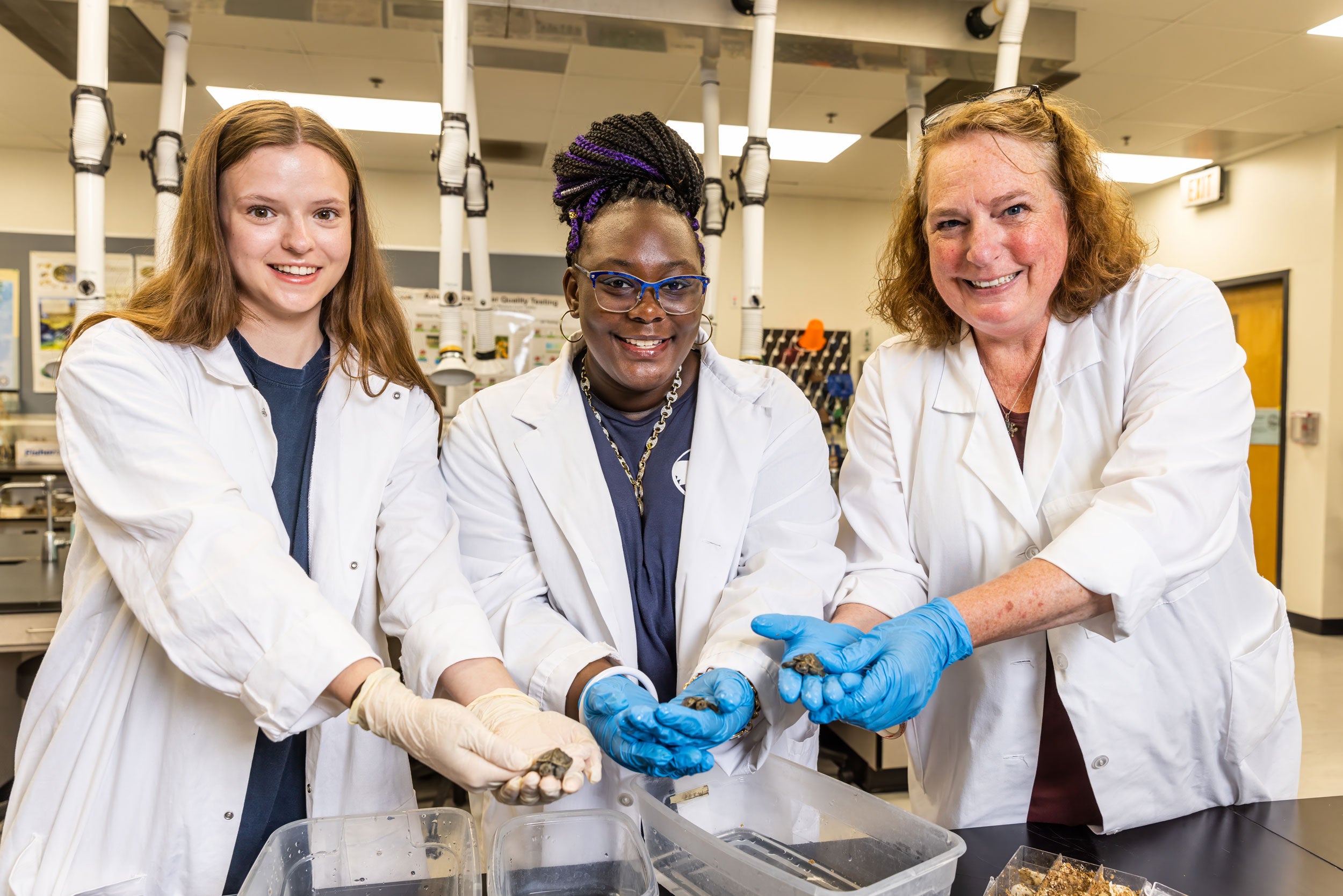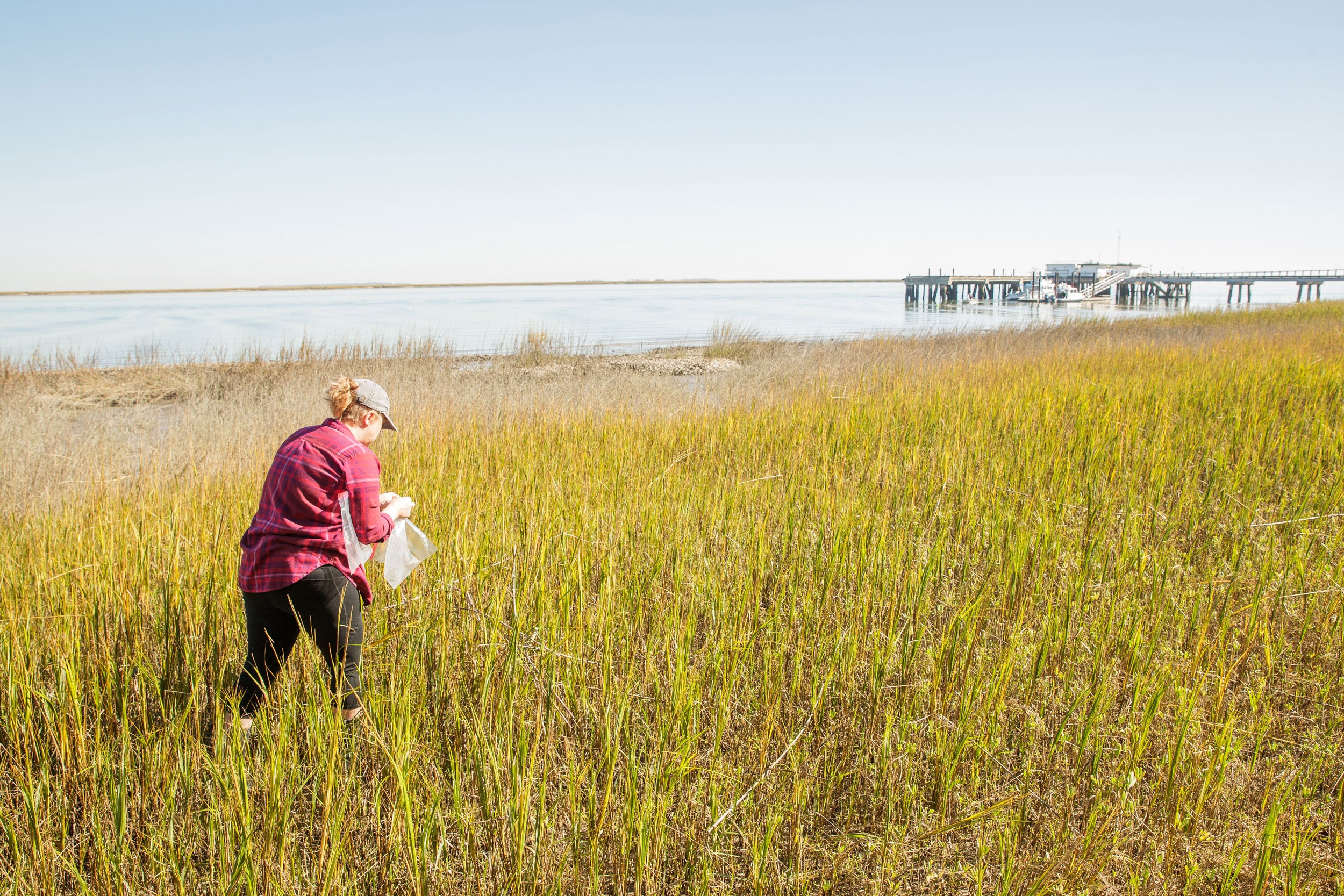Get a one-of-a-kind doctoral degree that will equip you to meet the increasing demand for environmental scientists who can better steward the environment and protect human health.
Locations
- Statesboro Campus (In Person)
- Armstrong Campus (In Person)
Why get a PhD in Environmental Science?
- Pursue the only degree of its kind in the state of Georgia—an interdisciplinary program applying science, technology, education and mathematics to environmental science and sustainability.
- Work in the James H. Oliver Jr. Institute for Coastal Plain Science (ICPS), an interdisciplinary research and education center directed toward understanding the physical and biological resources below the Fall Line and their sustainable use and management.
- Explore opportunities across all science and mathematics disciplines and pursue research in a wide range of natural laboratories including forests, beaches, salt marshes, rivers and more along southeast Georgia’s coastal plain. Study abroad opportunities are also available.
- Secure an advisor from any department within GS’s College of Science and Mathematics.
As environmental issues become more and more relevant in daily life , we’re proud to offer a one-of-a-kind doctoral program that prepares graduates to meet the expanding challenges. Candidates have a unique opportunity to perform field work in a wide variety of coastal habitats, and the interdisciplinary structure of our program allows students to do research alongside world-class faculty in a wide range of specialized areas.
Studying through the School of Earth, Environment and Sustainability and the associated James H. Oliver, Jr., Institute for Coastal Plain Science, provides our doctoral students with rich opportunities for marine and coastal research, access to geological and geophysical field sampling equipment, and access to full Geographic Information Systems (GIS) capabilities. Our partnerships with the Skidaway Institute of Oceanography, Grays Reef National Marine Sanctuary and the University of Georgia Marine Extension Service provide even more opportunities.
If you want to put cutting-edge scientific expertise to work meeting new environmental challenges, our PhD in Environmental Science is the ideal path.
Ready to Apply?
What Can You Do With a PhD in Environmental Science?
PhDs in Environmental Science apply their knowledge to solving some of the most pressing issues of our time, meeting environmental challenges head-on, and discovering new ways of both protecting and stewarding the critical natural resources of our planet.
Where our graduates work:
- Georgia Department of Natural Resources
- Savannah River Ecology Laboratory
- ECT2 Water Treatment
- Florida Fish and Wildlife Conservation Commission
- Amicalola Falls State Park
- Aula Global Biological Reserve
- Charlie Elliott Wildlife Center
- City of Atlanta
- Coastal Georgia Center
- Eurofins Environment Testing America
What our graduates do:
- Fisheries Management
- 4-H Youth Development Specialist
- Agricultural Sanitarian
- Coastal Resilience Planning and Implementation
- Client Relations Specialist
- Urban Forestry Specialist
- Coral Reef Research Program Manager
- Community Development Planner
- Geographic Information Systems Analyst
- Environmental Consultant
- Ecotourism
- Environmental Education
What You’ll Learn
As a doctoral student pursuing an environmental science degree you will secure your own faculty advisor to assist you in focusing your research and planning your academic path. Core classes include training in:
- Integrative Environmental Science
- Genes, Organisms and Ecosystems
- Biogeochemical Cycles
- Applied Statistics
- Geospatial Data
- Computational Sciences
- Applied Environmental Chemistry
- Environmental Modeling
Secure an Advisor
PhD graduate students are advised by their program. Graduate students should reach out to their graduate program director for information regarding the structures in place to facilitate advisement. For more information visit Graduate Academic Advisement.

Meet Your Program Director
Graduate students can contact the Jack N. Averitt College of Graduate Studies for more information about their program director.

Explore Graduate Assistantships
Graduate assistantships are available to a select few students at Georgia Southern. For more information and to apply go here.
Take Action
For potential admission to the College of Graduate Studies to pursue graduate work leading to the PhD in Environmental Science, the applicant:
- Must have completed requirements for the bachelor’s or master’s degree in a college accredited by the proper regional accrediting associations.
- Must complete the Graduate Record Exam (GRE) (scores must be sent to the College of Graduate Studies) with a combined verbal and quantitative score typically at 300 or above.
- Must complete the TOEFL Exam with scores sent to the College of Graduate Studies (international students only).
- Must submit a statement of research interests and career goals as pertains to pursuing a PhD in Environmental Science.
- Must submit three letters of recommendation from individuals familiar with the applicant’s academic or professional experience.
- Typically, will have a minimum 2.8 cumulative grade point average (on a 4.0 scale) for all undergraduate and graduate (if applicable) coursework.
Follow these steps to complete the Georgia Southern application:
- Create an application account.
- Complete our online application using the PIN you received after creating your application account.
- Once complete, pay the $50 application fee or upload a valid fee waiver. Previous Georgia Southern applicants and dual-enrollment students do not need to pay the fee.
You can check your application status at My.GeorgiaSouthern.edu/admissions three days after completing your application. This page contains live information about your admission status, including a checklist of missing documents we need to make a decision.
Apply as a First-Year Student Transfer to Georgia SouthernGeorgia Southern University is accredited by the Southern Association of Colleges and Schools Commission on Colleges (SACSCOC) to award associates, baccalaureate, masters, educational specialists and doctorate degrees.
This course will explore the complex interdisciplinary nature of environmental science. Students will investigate how interdisciplinary approaches incorporating the scientific disciplines, mathematics, policy, and management can be combined to address real-world environmental issues. The course will often be team taught by 3 faculty and will contain a mix of lecture and project based learning. All students will gain scientific writing experience by developing a research proposal.
This course covers major principles of evolution and ecology, and application of these principles to the management of species and ecosystems. Topics include the origin and maintenance of genetic variation, evolutionary change of populations over time, the role of speciation and extinction in regulating biodiversity, and ecological interactions between organisms and their abiotic and biotic environments, at the scales of individuals, populations, communities, and ecosystems. These principles will be applied to conservation issues arising from global environmental change, and addressing these issues through sustainable management of species and ecosystems.
This course examines biogeochemical cycles (C, N, P, S, and metals), the environments in which these processes occur (hydrosphere, lithosphere, atmosphere, and biosphere), the chemical reactions that take place during these cycles, and the microorganisms that influence them. Additionally, a major theme is the effect of human activities on biogeochemical cycles.
This course provides an overview of statistical analyses and methods used in studies related to the biological and environmental sciences. The general emphasis of this course includes organizing and summarizing data, drawing inferences from population samples via estimation and significance tests, linear and generalized regression, random-effects models, time-series, and spatio-temporal analysis.
This course is designed to introduce methods of geospatial data acquisition, processing, mapping and analysis (from the field and from online geodatabases) in the environmental sciences.
An introduction to the application of mathematics to various biologically and environmentally related problems, which can be analyzed both analytically and numerically. Computational approaches for model analysis are introduced and include numerical solutions of linear and nonlinear models, numerical differentiation and integration, data fitting, and other numerical methods.
This course covers a variety of chemical fields as they apply to the five essential human needs: water, food, health, waste management, and energy. Various materials, including metals, inorganic and organic compounds, polymers, and proteins, as well as their applications, will be introduced. Basic research and cutting-edge technologies will be discussed.
An introduction to the study of environmental phenomena that exhibit complexity emergent from a wide variety of parameters. An interdisciplinary course that employs the study of a variety of physical, biological, and chemical problems. Students learn how to construct and analyze minimal mathematical, physical, and computational models that provide informative answers to precise questions about: population dynamics; species interactions (e.g., competition, predation, parasitism); reaction kinetics; sedimentation; biological oscillators; coupled reaction networks; molecular motors; limit cycles; reaction diffusion; nitrogen fluxes in low-relief watersheds; recovery from acid deposition in mountain streams; bacterial patterns; nitrogen budgets on permaculture farms; and the sustainability of human activity on the Earth.
Do I need to secure a potential faculty advisor before I submit an application to the program?
- Yes. Students will only be admitted to the Environmental Science Ph.D. program if a faculty member has agreed to serve as their Ph.D. advisor. Thus, applicants should identify and communicate with potential advisors prior to the application process. Information on faculty within the College of Science and Mathematics can be found on the various departmental pages. See https://www.georgiasouthern.edu/cosm/departments/
Can I use an unofficial transcript for application purposes?
- Official transcripts are required for admission into the Environmental Science Ph.D. program. International applicants must have their official transcripts evaluated by a NACES accredited evaluation service. See this page for more details: https://cogs.georgiasouthern.edu/admission/applynow/
Is there a possibility of getting the GRE exam requirements waived?
- There is no GRE waiver available for the Environmental Science Ph.D. program.
Is the Duolingo English test accepted in place of the TOEFL?
- No, international applicants must complete the TOEFL exam. See this page for more details: https://cogs.georgiasouthern.edu/admission/applynow/
Is there a possibility of getting my application fee waived?
- We are unable to waive the application fee for the Environmental Science Ph.D. program.
Are there funding opportunities for students pursuing the PhD in Environmental Science?There are a limited number of teaching assistantships available to graduate students pursuing the PhD in Environmental Science, but these are not guaranteed upon acceptance and are very competitive. Alternative sources of student support are sometimes available through external funding (e.g., grants and contracts) that have been obtained by faculty. As noted above, potential graduate students must secure a faculty advisor to be admitted to the PhD program so discussions regarding the sources and availability of student support should be completed and negotiated between the student and faculty advisor. In addition, a limited number of out-of-country tuition waivers are available to international students through the Office of Graduate Admissions (see: https://cogs.georgiasouthern.edu/admission/applynow/).
The Graduate Student Organization (GSO) is committed to representing and supporting the interests of all current and prospective graduate students at Georgia Southern University and seeks to support scholarly activities as well as promote social opportunities for the development of graduate students.
Related Programs

Take the Next Step
Make a positive impact on our world and begin your journey to become a PhD in Environmental Science.
Contact Us
School of Earth, Environment and Sustainability
P.O. Box 8149
Statesboro, GA 30460
912-478-5361
sees@georgiasouthern.edu
Graduate Program Director
Christine Hladik, PhD
Georgia Southern University
Statesboro, GA 30460-8149
Phone: 912-478-5361
chladik@georgiasouthern.edu


